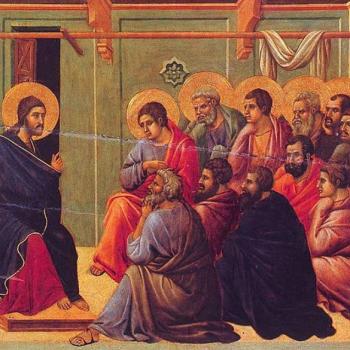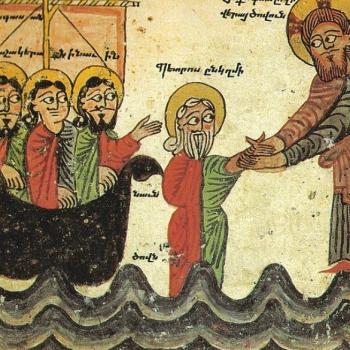The Apostles’ Creed reads that we believe in Jesus Christ, “conceived by the Holy Spirit, born of the virgin Mary.” At Christmastime we see symbols of Jesus’ virgin birth everywhere. But there are historical problems with the virgin birth of Jesus. Do we still really believe that Jesus of Nazareth was born of a virgin? And if we do, why does it still matter in 2023?
The Virgin Birth of Jesus Is Our Mystical Hope
Christians see the virgin birth of Jesus Christ as a sign of his special divinity. Virgins don’t give birth, so anyone without an earthly father must be supernatural.
But the phrase “conceived by the Holy Spirit, born of the virgin Mary” also describes both aspects of our belief about Christ: that, “conceived of the Holy Spirit,” Jesus Christ is one with God; but “born of Mary,” Jesus Christ is one with human beings.
Our Christian ancestors confessed that Jesus was one with God. But for the early Christians, Jesus wasn’t a supernatural being in a human costume. Jesus was a flesh-and-blood person with a mother, whose name and lineage we know.
This makes Christ’s Incarnation through his virgin birth the foundation for our hope in our mystical union with God. Jesus is where heaven and earth finally meet, and because they met in Mary they can meet in you and me, too. This idea is so ingrained in our faith that we hardly give it much thought at all.
But of course the story of the virgin birth is preposterous to non-believers. Virgin birth in general has such legendary roots that it is hard to think seriously about the virgin birth of Christ in 2023 without facing some troubling questions.
Objections to the Virgin Birth of Jesus
It is much easier to accept Jesus as an enlightened moral teacher than to accept the miraculous elements of his life as told by the Christian tradition, such as his virgin birth and resurrection from the dead. When Thomas Jefferson edited his Bible to be more rational, and therefore more “true,” the virgin birth and the resurrection of Christ were two of the first things to go.
Even among Christians, few modern theologians defend the story of the virgin birth. Admittedly, on the surface the story is weird. An angel appears to an unmarried teenage girl and tells her that God plans to impregnate her so that her baby can save the world. Any modern teenage girl with that story would be institutionalized and medicated.
But on a deeper level, even faithful Christian theologians like Wolfhart Pannenberg do not always support the doctrine of the virgin birth of Christ because of the way it originated in the Christian tradition:
- The virgin birth seems like a late addition to the Jesus story. Only Matthew and Luke tell the story of Jesus’ virgin birth, and Paul never mentions Jesus’ virgin birth. It doesn’t seem to be an important point of doctrine until after the time of the apostles.
- According to modern Christian scholars, the early church developed the story of the virgin birth to explain how Jesus was one with God. God is eternal, so if Jesus is one with God he has to be eternal too. People with parents and grandparents are not eternal, so by replacing Jesus’ father with the Holy Spirit, the early Christians could explain how Jesus was eternal.
- There are too many parallels in the mythology of the Mediterranean to ignore. All sorts of Egyptian, Greek, and Roman heroes and gods were born of virgin mothers or in miraculous circumstances. Even some remarkable individuals, like the philosopher Plato, were said to have been born of virgins by their later biographers.
In The Apostles’ Creed in Light of Today’s Questions, Pannenberg writes: “So in the virgin birth we have to do with a legend. That can be asserted with complete certainty, because the transmitted text itself shows so clearly the motive for the legendary rise of the tradition.”
Christianity’s earliest sources don’t mention Jesus’ virgin birth. Virgin birth was a common theme in the ancient Mediterranean. Adopting that theme helped early Christianity solve a difficult problem with their claims about Jesus. So isn’t it obvious that the virgin birth is a mythological appendage to the gospel, a vestigial organ like an appendix?
Can we still confess the virgin birth and mean it? Do we still have to defend it, and how can we take it seriously?
Athanasius, On the Incarnation
None of these doubts or objections to the faith are new. In the 4th century, Athanasius of Alexandria wrote On the Incarnation to answer these questions and explain to Christians, and their critics, why the story of God-made-flesh-in-Jesus matters so much. His section on the virgin birth of Jesus shows how, by the 300’s AD, it had become a cornerstone of Christian teaching:
The Word saw the reasonable race, the race of men that, like himself, expressed the Father’s mind, wasting out of existence, and death reigning over all in corruption… He saw, too, how unthinkable it would be for the law to be repealed before it was fulfilled… Pitying our race, moved with compassion for our limitation, unable to endure that death should have the mastery… he took to himself a body, a human body even as our own. Nor did he merely become embodied or merely appear; had that been so, he could have revealed his divine majesty in some other and better way.
No, he took our body, and not only so, but he took it directly from a spotless, stainless virgin without the agency of a human father… He, the Mighty One, Creator of all, himself prepared this body in the virgin as a temple for himself, and took it for his very own…
The Word perceived that corruption could not be got rid of otherwise than through death; yet he himself, as the Word, being immortal and the Father’s Son, could not die. For this reason, therefore, he assumed a body capable of death. It was by surrendering to death the body which he had taken, as an offering and sacrifice free from every stain, that he abolished death for his human brethren by the offering of the same…
He fulfilled in death all that was required. Naturally also, through this union of the immortal Son of God with our human nature, all men were clothed with incorruption in the promise of the resurrection… The human race would have perished utterly had not the Lord and Savior of all, the Son of God, come among us to put an end to death.
The Virgin Birth of Jesus Matters Because the Whole Story Matters
Yes, there are surface parallels in the mythology of the Ancient Mediterranean. Yes, the full understanding of what God did for us in Jesus Christ, from birth to death to resurrection, took a while to develop. Yes, the virgin birth is hard to accept if you have doubts about the Bible and the Christian story.
But by the time we get to Athanasius (and already in the New Testament), the miraculous birth, life, work, teachings, death, and resurrection of Christ form a whole story of God becoming one with humanity, spiritually, physically, and historically, to bring humanity home to God. The old Christian mystics said it like this:
“In Christ, God became what we are to make us what God is.”
When we start cutting out the weird or embarrassing parts of the story, we diminish that wild, spiritual, mystical hope until there’s nothing left.
I don’t claim to have any proof that Jesus was actually born of a virgin. How could I? But I declare Jesus’ conception by the Holy Spirit and birth from a virgin as articles of my faith in him, because the whole story has power to bring me into contact with God.
For more about how the Jesus story has impacted my life, and why I care so much about it, check out my YouTube channel here. Merry Christmas!

















